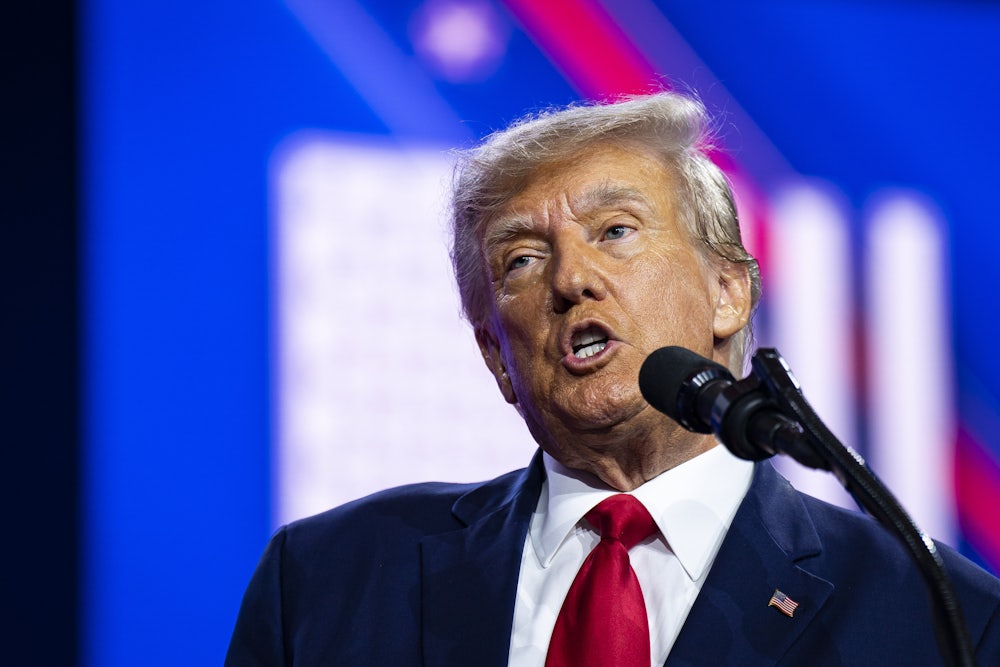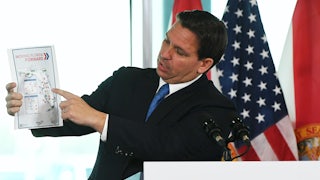Ten months before the first Republicans have the chance to vote for a 2024 nominee, and still weeks before many candidates (including Ron DeSantis) formally enter the fray, the GOP presidential race has already reached its breathless, heart-racing stage.
Every new national poll is overhyped with such headlines as “Florida Gov. Ron DeSantis loses lead in 2024 GOP race, now trails Donald Trump, poll finds.” Republican insiders brood about a certain former president: “GOP grapples with how to control Trump—again,” read a recent CNN headline. And dark-horse putative candidates are getting their moment in the sun. A Politico profile of New Hampshire Governor Chris Sununu featured the cover line, “Washington’s Favorite Republican Is Making All the Right Moves.”
Once again, political reporters and campaign analysts are making their traditional quadrennial mistake—getting too far ahead of the story in their eagerness to handicap the presidential race. As Tom Rath, a former New Hampshire attorney general who has been advising GOP presidential candidates since the 1980s, said to me, “Reporters want to run the horserace before the horses are even in the starting gate. There’s a lot more to unfold here. That’s why polling is worthless.”
Complicating everything is the widespread assumption that 2024 will be a replay of 2016. That year Trump prevailed against a divided field, partially due to the GOP’s love of winner-take-all primaries that allowed the reality TV star to win all of Florida’s 99 delegates with just 46 percent of the vote. The belief that campaign history repeats itself reflects the reality that political reporters, even more than Russian generals, love to fight the last war. But much of the certainty surrounding a Trump-DeSantis steel-cage match is rooted in a hazy understanding of the Republican Party’s delegate rules and the sometimes misleading nature of early presidential polling.
Here is a handy, clip-and-save guide to common misconceptions about the coming Republican presidential race:
Fluctuations in Trump-DeSantis Polls Are Revealing
Wrong. Granted, Nate Cohn in a recent New York Times analysis argued, “The leader in polls conducted in the first quarter of the year before the primaries has won the nomination more often than not in the modern primary era, dating to the 1970s.” But that counts comparatively easy primary races such as George H.W. Bush in 1988, Al Gore in 2000, and Hillary Clinton in 2016.
Looking at the early polling in the last three contested GOP races points to a different conclusion.
Start with a giggle from the past: Rudy Giuliani led in virtually every 2007 national poll until just a month before the Iowa caucuses. In March 2011, the eventual nominee, Mitt Romney, was ahead in some polls, but former Arkansas Governor Mike Huckabee, who ultimately did not run, held the edge in other national surveys. And at this point in 2015, before Trump reared his orange head, Jeb Bush and Wisconsin Governor Scott Walker (who dropped out by September 2015) dominated the pole position.
National polling for presidential primaries also ignores the reality that delegate contests are sequential. Winning Iowa or New Hampshire can give a Republican candidate an immediate polling boost, regardless of their prior national standing. And things can change fast in the early going: In late December 2011, Rick Santorum was mired in the single digits in Iowa. A week later, Santorum narrowly won the caucuses, and, as a result, ended up as Romney’s main foil for the nomination.
The Money Chase Is What to Watch
Wrong. In 1995, Texas GOP Senator Phil Gramm confidently declared, “I have the most reliable friend that you can have in American politics, and that is ready money.” Gramm dropped out after Iowa. In 2015, Jeb Bush was awash in money. His super PAC blew through $118 million, while his campaign spent another $34 million. And, of course, in 2020 Democrat Michael Bloomberg squandered a stunning $1.1 billion of his own money in just three months on his way to winning the caucuses in American Samoa.
Last month, it was front-page news that the conservative fundraising network originally associated with the Koch brothers was going to oppose Trump in the GOP primaries. But it is easy to overplay the significance of this anti-Trump move. Super PACs are handicapped in primaries because they are legally charged a much higher rate for TV ads than the candidates themselves. Also, the saturation media coverage of the presidential race means major contenders for the White House are much less dependent on TV ads than, say, Senate or House candidates.
“Money’s role in presidential primaries is overstated,” said David Karol, a political scientist at the University of Maryland. “That’s especially true now that small donors are so important for a candidate who hits a chord with the voters.”
The GOP Race Will Be Decided on Fox News
Wrong. Semafor reported last week that Trump is suddenly facing a “soft ban” on Fox News, which is giving increasing amounts of airtime to such rivals as DeSantis and Nikki Haley. Steve Bannon, speaking at CPAC, attacked the owner of Fox News, saying, “Murdoch, you’ve deemed Trump’s not going to be president. Well, we’ve deemed that you’re not going to have a network.” While the Rupert Murdoch primary may matter at the margins, it is a common mistake for reporters to overhype the importance of cable TV news for most voters.
Even as its last fragments of journalistic credibility were vanishing in revelations from the Dominion Voting Systems case, Fox News was burbling about its TV ratings. In a press release last week, the Tucker Carlson right-wing megaphone network bragged that it “averaged 1.4 million total viewers in February” and 2.3 million in prime time. Maintaining the ratings, in fact, may force Murdoch to do an about-face and again genuflect before Trump to avoid losing viewers to Newsmax.
The current Fox News numbers are impressive until you realize that 30 million Republicans voted in the 2016 presidential primaries. As a result, it is safe to assume that about 27 million of these GOP stalwarts are not watching Fox News on a typical evening. Reporters sometimes forget that most primary voters have better things to do with their lives than watch Tucker Carlson or Sean Hannity.
In contrast, most political journalists are addicted to cable news, as many of them dream of a network pundit contract. So media coverage almost always exaggerates the importance of cable TV news. And it downplays other more pedestrian sources of political information, such as local TV news and the nightly reports on the broadcast networks.
The Iowa Caucuses Are Toast
Wrong. While the Democrats have completely revamped their primary calendar, the Republicans have remained the party of rock-ribbed tradition. The GOP campaign season will begin, as always, on a wintry Monday night in Iowa, probably on January 8. New Hampshire, also downplayed by the Democrats, will most likely hold its primary on either January 16 or 23. And then on the GOP side, South Carolina would go third.
This means, in practice, that personal campaigning will matter for the non-Trump candidates in the three small starting-gun states. What is impossible to handicap at this early stage is what the possible presence of Sununu on the New Hampshire ballot and the already declared candidacy of former South Carolina Governor Nikki Haley—and the potential candidacy of the state’s current Senator Tim Scott—will do to shape the expectations surrounding these early contests.
It’s 2016 All Over Again for the GOP
Wrong. Bill Weld’s quixotic challenge to Trump for the 2020 nomination has been totally forgotten, except when it comes to how Republicans will choose convention delegates in 2024. Josh Putman, a political scientist who is an invaluable chronicler of presidential primary calendars, points out that 30 states and territories changed their delegate rules in the run-up to 2020 to make it nearly impossible for Weld and other never-Trump Republicans to gain delegates.
In 2020, about 60 percent of the convention delegates were chosen in winner-take-all primaries or in contests in which a candidate (Trump) who won over 50 percent (or sometimes a bit more) of the vote received the entire delegate haul. This time around, states have until October 1 to decide how they are going to allocate their delegates. But in all likelihood, inertia will rule. As Putnam theorizes in a recent blog post on his website, FrontloadingHQ, “If decision makers in state parties across the country cannot see a clear advantage to an allocation change one way or the other, then it is more likely that the 2020 baseline method survives into 2024.”
Who benefits from this system?
It’s not necessarily Trump. DeSantis or another candidate could unify the anti-Trump vote. So harking back to 2016 is not the only model for 2024. Equally plausible is that Trump and DeSantis could scrap for every delegate until the convention, as Jerry Ford and Ronald Reagan did in 1976.* And in a multicandidate field, the challenge of winning 50 percent of the vote to trigger winner-take-all rules may prove daunting.
In an interview, Putnam said, “I think the minutiae of the delegate allocation rules are likely to be a red herring in understanding 2024.” More important, in Putnam’s view, is the number of states on the Republican side that may decide to abandon primaries for caucuses, which are much more likely to be dominated by right-wing activists. Because of a comparatively early July 15 GOP convention in Milwaukee, the Republicans have banned all June primaries. That means that states such as New Jersey will have to either move their traditional June primaries (to the consternation of down-ballot candidates) or switch to an earlier caucus to pick GOP convention delegates.
Humility is a rare quality in campaign journalism. But never has it been so sorely needed. For the abiding truth of presidential primaries is that events always conspire to defeat glib certainty. Over the coming year, the GOP primary race will undoubtedly offer a crash course in the law of intended consequences.
*An earlier version of the story misidentified the candidates competing in 1976.






